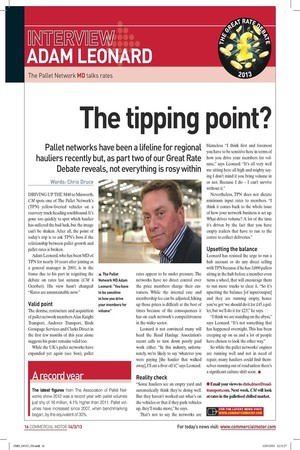The tipping point?
Page 9

If you've noticed an error in this article please click here to report it so we can fix it.
Pallet networks have been a lifeline for regional hauliers recently but, as part two of our Great Rate Debate reveals, not everything is rosy within Woras: wins uruce DRIVING UP THE M40 to Minworth, CM spots one of The Pallet Network's (TPN) yellow-liveried vehicles on a recovery truck heading southbound. It's gone too quickly to spot which haulier has suffered the bad luck, but the image can't be shaken. After all, the point of today's trip is to ask TPN's boss if the relationship between pallet growth and pallet rates is broken.
Adam Leonard, who has been MD of TPN for nearly 10 years after joining as a general manager in 2001, is in the frame due to his part in reigniting the debate on rates last autumn (CM 4 October). His view hasn't changed: "Rates are unsustainable now."
Valid point The demise, restructure and acquisition of pallet network members Alan Knight Transport, Andover Transport, Birds Groupage Services and Clarks Direct in the first few months of this year alone suggests his point remains valid too.
While the UK's pallet networks have expanded yet again (see box), pallet rates appear to be under pressure. The networks have no direct control over the price members charge their customers. While the internal rate and membership fee can be adjusted, hiking up those prices is difficult at the best of times because of the consequences it has on each network's competitiveness in the wider sector.
Leonard is not convinced many will heed the Road Haulage Association's recent calls to turn down poorly paid work either. "In this industry, unfortunately, we're likely to say 'whatever you were paying [the haulier that walked away], I'll cut a fiver off AT says Leonard.
Reality check "Some hauliers see an empty yard and automatically think they're doing well. But they haven't worked out what's on the vehicles or that if they park vehicles up, they'll make more," he says.
That's not to say the networks are blameless. "I think first and foremost you have to be sensitive here in terms of how you drive your members for volume," says Leonard. "It's all very well me sitting here all high and mighty saying I don't mind if you bring volume in or not. Because I do — I can't survive without it."
Nevertheless, TPN does not dictate minimum input rates to members. "I think it comes back to the whole issue of how your network business is set up. What drives volume? A lot of the time it's driven by the fact that you have empty trailers that have to run to the centre to collect deliveries."
Upsetting the balance Leonard has resisted the urge to run a hub account or do any direct selling with TPN because if he has 3,000 pallets sitting in the hub before a member even turns a wheel, that will encourage them to run more trucks to clear it. "So it's upsetting the balance [of input/output] and they are running empty, hence you've got 'we should do it for £45 a pallet, but we'll do it for £23'," he says.
"I think we are standing on the abyss," says Leonard. "It's not something that has happened overnight. This has been creeping up on us and a lot of people have chosen to look the other way."
So while the pallet networks' engines are running well and not in need of repair, many hauliers could find themselves running out of road unless there's a significant culture shift soon. • • Email your views to chris.druce@roadtransport.com. Next week, CM will look at rates in the palletised chilled market. Awirsiis ii IThe latest figures from The Association of Pallet Networks show 2012 was a record year with pallet volumes just shy of 16 million, 4.1% higher than 2011. Pallet volumes have increased since 2007, when benchmarking began, by the equivalent of 30%.






































